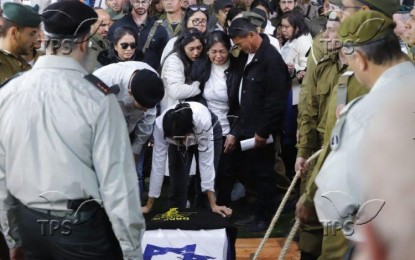
JERUSALEM – The story of Philippine-born Sgt. 1st Class (res.) Cydrick Garin captured the hearts of Israelis as they learned about his journey from a challenging upbringing to becoming a decorated soldier.
Garin, 23, was among the 21 soldiers killed on Jan. 22 when a blast ripped through a Gaza compound being prepared for demolition.
The explosion happened when a Palestinian terror squad fired an anti-tank missile at the adjoining homes in the complex. The explosives being used by the Israeli forces to demolish the compound detonated and the two buildings collapsed.
The tragedy took place 600 meters from the Israel-Gaza border.
Born into the immigrant labor community, Garin’s life was marked by adversity from an early age.
Raised by his mother, Imelda, who worked in Tel Aviv as a cleaner to support the family, Garin, faced the absence of his father, Rico, who was deported when the young Garin was only two years old.
Cydrick’s struggles intensified as financial difficulties led him to associate with criminal elements at the age of 15.
“Always when I would ask questions in class, always when a volunteer or someone to help was needed, it was Cydrick, the man who put himself before everyone else,” his teacher from South Tel Aviv’s Bialik-Rogozin School, Omri Gor, said in a tearful eulogy.
Garin’s classmate, Golan, painted a vivid picture of those difficult times.
“In class, you would sleep from too much work. After school, you would rush to work to help mother close the month. You and I would split up and make do with half a sandwich. And if it was missing, I would jump out of the school gate to steal a snack for us from the grocery store,” he said.
Faced with the consequences of his actions, Garin made a pivotal decision to turn his life around.
He saw enlisting in the Israeli Defense Forces as a pathway to redemption and a chance to contribute positively to society.
However, his criminal background initially posed a barrier to entry. Undeterred, on the day of enlistment, Garin insisted on staying at the base until the sorting officer arrived, “and told him to ‘get on the bus that leads to the base,'” Garin’s unit commander recalled.
That determination paid off as Garin went on to become a member of the Givati infantry brigade, quickly earning a reputation as a trustworthy and dedicated soldier.
He received recognition from the military’s Southern Command for being an outstanding soldier in the unit.
“You were a warrior. Every commander would want a hundred of him,” the unit commander said.
‘I couldn’t say no to him’
Garin’s mother, Imelda, speaking with tears in her eyes, expressing both pride and grief: “My son wanted to be a fighter, I couldn’t say no to him.”
“He fulfilled his dream, defended and fought for the State of Israel. As a mother, it is very hard to think that my son is gone. Cydrick was everything to me in Israel,” she said.
Despite the tragedy, there was a glimmer of hope in the form of community unity. Members of the Filipino community, facing challenges in enlisting due to unresolved civil status issues, emphasized their eagerness to contribute to the nation.
Around 30,000 Filipinos work in Israel, filling positions in caregiving, domestic work, and other low-skilled labor sectors.
The funeral was attended by hundreds of Filipinos. Cydrick is not the only Filipino who sought to be accepted into Israeli society through military service. Quite a few came to pay their last respects in military uniforms and carrying weapons.
“Many of us are enlisting and are now in Gaza,” said Roniel Macrague, who is now in reserve service in the south.
Other young people from the community explained that they too want to enlist, but because their civil status is not regulated, they are refused.
However, Garin’s sacrifice prompted authorities to expedite the processing of his mother’s citizenship application.
Garin’s father, Rico, who had not seen his son for more than 20 years, was deeply moved and expressed gratitude to the people of Israel at the funeral.
“Even if it is raining now, I want to thank you, and I know you are with us now,” he said, tears streaming down his face.
In a poignant display of unity, the funeral service featured both a community priest and a military rabbi.
And as the rain mingled with the tears of those present, the community sang “Hallelujah.” (TPS)
